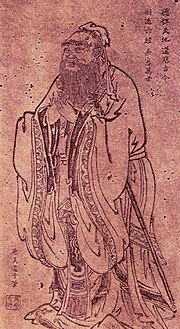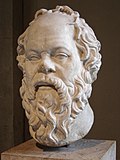organisational rights". It was central to Zhu Xi's integration of Buddhism into Confucianism. Zhu Xi held that li, together with qi (氣: vital, material force), depend... 3 KB (372 words) - 12:34, 6 August 2023 |
 | way of thinking Neo-Confucianism. Neo-Confucianism held sway in China, Japan, Korea and Vietnam until the 19th century. Confucianism can first be traced... 26 KB (3,577 words) - 10:00, 18 March 2024 |
 | Chinese philosophy (section Neo-Confucianism) important figures of Neo-Confucianism. Zhu Xi was a leading figure in Neo-Confucianism. Wang Yangming was an important figure in Neo-Confucianism. During the Industrial... 41 KB (4,890 words) - 04:16, 23 April 2024 |
List of Chinese philosophers (section Neo-Confucianism) criticised Neo-Confucianism, instead emphasized the search for truth in daily living. Dai Zhen, made two arguments against Neo-Confucianism. Fan Zhen,... 6 KB (687 words) - 23:24, 11 April 2024 |
 | East Asian religions (redirect from Taoism and Confucianism) Confucianism. Despite Neo-Confucianism's incorporation of elements of Buddhism and Taoism, its apologists still decried both faiths. Neo-Confucianism... 22 KB (2,711 words) - 17:09, 8 April 2024 |
 | Korean philosophy (section Neo-Confucianism) a totality of world view. Some aspects of Shamanism, Buddhism, and Neo-Confucianism were integrated into Korean philosophy. Traditional Korean thought... 10 KB (1,297 words) - 07:42, 11 March 2024 |
 | Ren (philosophy) (redirect from Jen (Confucianism)) that it meant to "love others". Ren also has a political dimension. Confucianism says that if the ruler lacks ren, it will be difficult for his subjects... 9 KB (1,114 words) - 08:13, 3 April 2024 |
Tao (section Neo-Confucianism) of Heaven in Neo-Confucianism. The Way is contained within all things. Thus, the religious life is not an elite or special journey for Neo-Confucians.... 49 KB (6,228 words) - 23:41, 13 April 2024 |
 | Zhu Xi (category Neo-Confucian scholars) during the Song dynasty. Zhu was influential in the development of Neo-Confucianism. He contributed greatly to Chinese philosophy and fundamentally reshaped... 31 KB (3,858 words) - 15:25, 31 March 2024 |
 | Sinosphere (section Neo-Confucianism) of neo-Confucianism. During the Tang dynasty, Buddhism from Nepal also became a prominent philosophical and religious discipline. Neo-Confucianism has... 90 KB (8,865 words) - 01:45, 11 April 2024 |
Japanese philosophy (section Confucianism) Edo period, Confucianism was the authorised study. Various schools of neo-Confucianism were popular. The Zhu Xi school of neo-Confucianism respected family-like... 27 KB (3,526 words) - 01:21, 20 November 2023 |
 | I Ching (section Neo-Confucianism) often to provide guidance for moral decision-making, as informed by Confucianism, Taoism and Buddhism. The hexagrams themselves have often acquired cosmological... 59 KB (6,158 words) - 15:19, 24 March 2024 |
 | Religion in the Song dynasty (section Neo-Confucianism) Confucian response to Taoism and Buddhism in the form of Neo-Confucianism. While Neo-Confucianism was initially treated as a heterodox teaching and proscribed... 55 KB (8,031 words) - 23:31, 26 April 2024 |
utilitarianism - Neo-Confucianism - Neoconservatism- Neo-Hegelianism - Neoliberalism - Neo-Kantianism - Neo-Luddism- Neoplatonism - Neopythagoreanism - Neo-Scholasticism... 12 KB (758 words) - 00:31, 9 April 2024 |
Tonghak; lit. '"Eastern learning"') was an academic movement in Korean Neo-Confucianism founded in 1860 by Choe Je-u. The Donghak movement arose as a reaction... 5 KB (605 words) - 19:25, 28 March 2024 |
 | Religion in Japan (section Confucianism) individual. The rationalism of Neo-Confucianism was in contrast to the mysticism of Zen Buddhism in Japan. Unlike the Buddhists, the Neo-Confucians believed that... 74 KB (7,348 words) - 01:38, 17 April 2024 |
part of an ethics of self-cultivation and self-transformation." Self Neo-Confucianism Eastern philosophy "self-cultivation". Merriam-Webster Online-Dictionary... 28 KB (3,257 words) - 21:01, 3 March 2024 |
East Asian Neotaoism Tiantai Huayan Chan Zen Neo-Confucianism Korean Confucianism European Christian Augustinianism Scholasticism Thomism Scotism Occamism... 63 KB (7,333 words) - 13:29, 18 April 2024 |
 | Confucius (category Confucianism) Tang and Song dynasties, Confucianism developed into a system known in the West as Neo-Confucianism, and later as New Confucianism. From ancient dynasties... 102 KB (10,820 words) - 05:52, 24 April 2024 |
 | Zhou Dunyi (category Neo-Confucian scholars) nature. He was a major influence to Zhu Xi, who was the architect of Neo-Confucianism. Zhou Dunyi was mainly concerned with Taiji (supreme polarity) and... 13 KB (1,445 words) - 23:47, 29 January 2024 |
 | Three teachings (category Religious Confucianism) Song dynasty, in which both Buddhism and Taoism became less popular. Neo-Confucianism (which had re-emerged during the previous Tang dynasty) was followed... 12 KB (1,307 words) - 19:10, 27 January 2024 |




